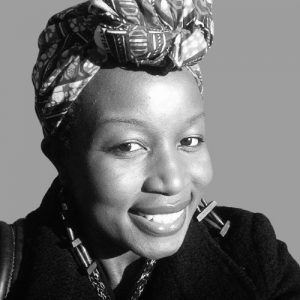Ugandan writer Arao Ameny earned her MFA in fiction writing from the University of Baltimore Creative Writing & Publishing Arts program in 2019. Last year, her first published poem, “Home Is a Woman,” featured in The Southern Review,” set off a domino effect of award recognition. “Home” received The James Olney Award from The Southern Review, nomination for inclusion in the 2021 Best New Poets anthology, and finalist status for the UK-based Brunel University International African Poetry Prize. Arao was also invited to be a guest reader in the United Nations Public Policy Forum, Africa Dialogue Series. She was recently hired as a biography writer and editor at Poetry Foundation, publisher of Poetry Magazine.
Ameny received a Poets & Writers’ 2021 Open Door Career Advancement Grant and also a 2022 Mayor’s Individual Artist Award from the Creative Baltimore Fund, a grant from Mayor Brandon M. Scott, the City of Baltimore, and The Baltimore Office of Promotion & The Arts (BOPA).

photo by John Maxum
Welter staffers Patrick Brinsfield and Adeola Adeyemo talked to her about her success, her recent writing life, her ability to work in more than one genre, and her favorite midnight snack. (Hear her read “Home is a Woman” below!)
First, congratulations on winning The Southern Review’s 2020 James Olney Award for poetry. How does getting this kind of recognition affect your writing or sense of yourself as a poet?
Winning the James Olney Award for poetry was a personal milestone for me. I was always scared to share my work for fear of rejection (especially poetry), so this award has given me the boost—and has lit a fire in me—to continue going.
What was your inspiration behind your winning poem. “Home is a Woman”?
The experiences of my mother and the women in my family inspired this poem. Also, largely, the lack of women’s land rights and inheritance in Uganda. It’s a topic that interests me.
How has your MFA in Creative Writing impacted your journey as a writer and poet?
Getting my MFA at the University of Baltimore made me more focused. I had a fiction concentration and also took a poetry class with Steven Leyva. This really helped me hone in on what I wanted to do. It enriched my writing and provided me with a community of writers that I still share ideas and keep in touch with.
Why did you get into poetry as a way of sharing your voice?
I’ve been writing poetry since I was 9 years old, I just didn’t share it. I’ve written poetry alongside short stories, fiction stories, songs and plays. It was during my MFA program that I decided I wanted to be a multi-genre writer. I didn’t want to limit myself. I find poetry to be very healing and a way to write in a concise but impactful way.
Can you describe your writing process?
I am a night owl. I write between 2AM to 5AM. I don’t write very well in the daylight, so I do my best work at night. Also, I’m not a morning person at all. I also play a lot of music during the process and eat a lot of cashews. I hand write and then I transfer to my laptop.
You have a dedicated social media account where you share the books you read. What are you reading at the moment?
At the moment, I am reading a chapbook of poetry called Wreck by Michael Akuchie. He’s a young Nigerian poet who is absolutely amazing. I found his writing on Twitter and started following his writing. I am also reading Contemporary Plays by African Women edited by Yvette Hutchinson and Amy Jephta. I’m not reading any prose at the moment. I read two to three books at a time because I have a short attention span.
That’s quite interesting. I’ve had professors who say they find it easy to read multiple books at a time. Do you feel you can manage that well?
Yeah, it’s kind of like flipping the channel to a different station. Like moving from the news to a sci-fi channel. That’s how I think of it.
How has your own writing been influenced by the works you’ve read?
I see influences from the work that I’ve read in my own work. What I’m trying to do is emulate writers that I love but at the same time figure out my own unique voice. It was a process during my MFA program and it’s still a process now.
Was there ever a moment in your writing journey when you wanted to give up? How did you get through it?
I wanted to start my MFA when I was in New York City, but it was incredibly expensive and I was discouraged. Then my mother passed away, hence I had many family responsibilities, so I put my dreams on a shelf. However, when I was taking care of my teenage brother for almost two years, I realized I could still pursue my creative writing career by taking evening classes at the University of Baltimore, and I kept on going from there.
If you could go anywhere in time for one day, where would you go and why?
I would go back to 2015, before my mother’s cancer diagnosis and I would read to her the poems I’ve written for her. Fifty-three poems for her 53 years of life she spent on this earth called Letters to Aya. I think when we lose loved ones, we continue to live our lives but we also become living memorials to those lives lost. Writing is memory.
